Optimizing your website for organic search isn’t something you can set and forget; it’s an ongoing initiative that requires your full attention and long-term planning.
SEO project management templates give you space to plan all the work and make sure no tasks fall through cracks. Whether you’re doing SEO on your own or managing a team, these templates will help you stay organized, on track, and ahead of the curve.
monday.com: An SEO content management template
monday.com is a collaborative relational database solution with built-in project management capabilities. You can use it to keep track of just about anything, from your budget and tasks to resources, assets, and SEO projects. With more than 200 free templates to choose from, there are plenty of places to start if you don’t feel comfortable starting from scratch.
More monday.com coverage: monday.com review | Airtable vs monday.com | Notion vs monday.com.
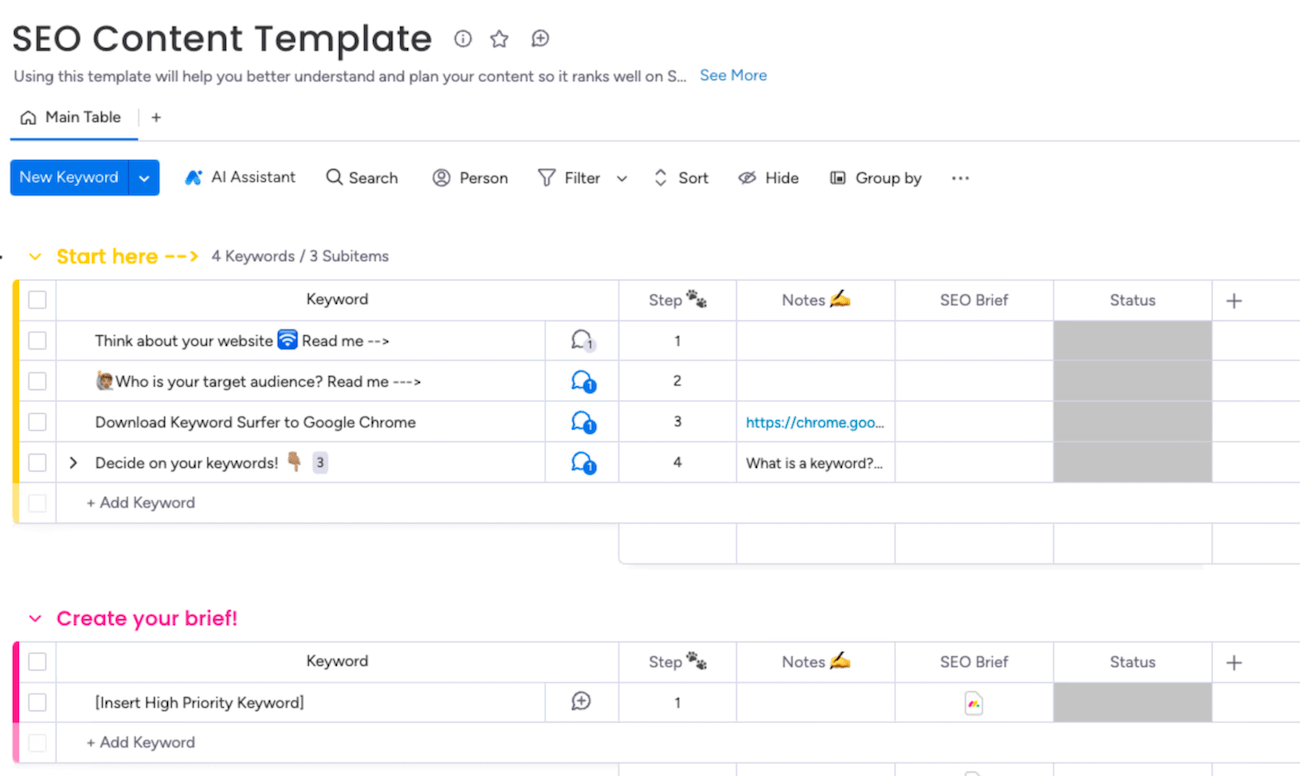
Because of its relational nature, you can set up multiple boards and tables that connect to each other rather than cramming everything into one place. Regardless of how you do it, your team can easily collaborate, manage their work, and switch between views at their leisure.
My favorite monday.com SEO template is a content planning tool that lets you map content based on keyword research.
It includes everything you need to go from keyword to published post, including brief creation, task management, and publishing activity. It’s a one-stop shop for content teams looking for a simple, yet effective way to organize operations.
You’ll be able to add or import keywords and relevant data, create subtasks (like opportunities or specific optimizations), attach SEO briefs, and assign tasks through the publishing stage.
While it doesn’t help with SEO audits or technical SEO, it’s a strong starting point.
ClickUp’s SEO project management templates
ClickUp is a powerful project management solution that’s customizable, feature-rich, and affordable. Beyond ready-made templates, you’ll get everything you need to manage projects at scale.
From built-in team chat to kanban boards, Gantt charts, and sprint management, ClickUp comes with a wide range of collaborative features to manage and scale your business. Plus, it offers a generous free plan and plenty of room to grow.
More ClickUp coverage: ClickUp review | ClickUp vs monday.com | ClickUp vs Notion.
SEO Project Management: An easy, yet feature rich template
This free SEO template from ClickUp is perfect for a wide range of SEO projects. You can use it for assigning and tracking one-off tasks, like compressing images or auditing headers, or ongoing SEO efforts, like content creation.
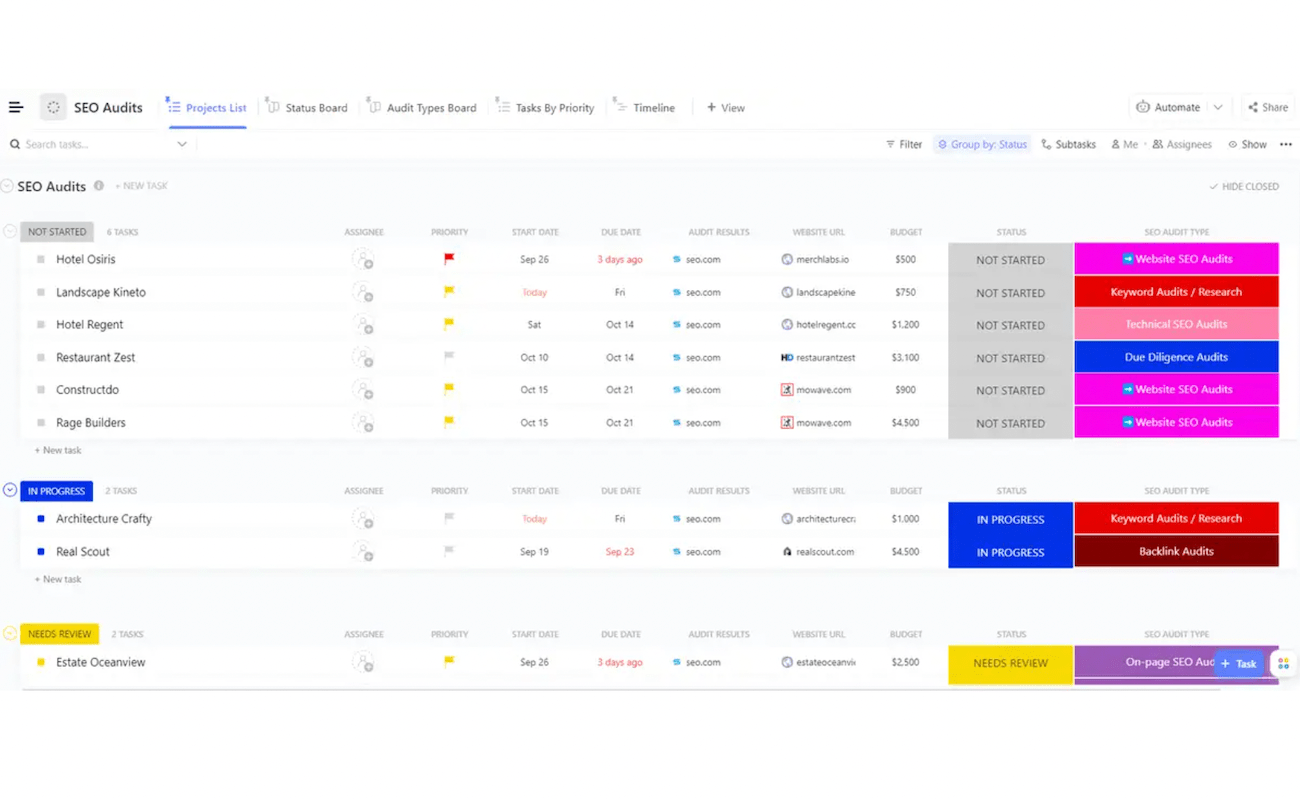
Just like the tool itself, ClickUp’s template is full of functionality, letting users organize and view all work in one place while others monitor big picture progress without getting in the weeds.
You can even track your budget, allocate resources, and collaborate in the same place.
It also comes with 16 custom statuses and five custom views, taking out a lot of the upfront work to make systems like these work. While there’s plenty to customize if you choose to do so, you can start using it in a matter of minutes.
SEO Checklist: A simpler alternative for tracking one-off tasks
SEO optimization includes numerous small and intricate tasks you’ll likely have to repeat for different pages or pieces of content. Keeping track of these details can be a challenge, especially when you’re optimizing multiple URLs at the same time.
ClickUp’s SEO checklist template solves this problem.
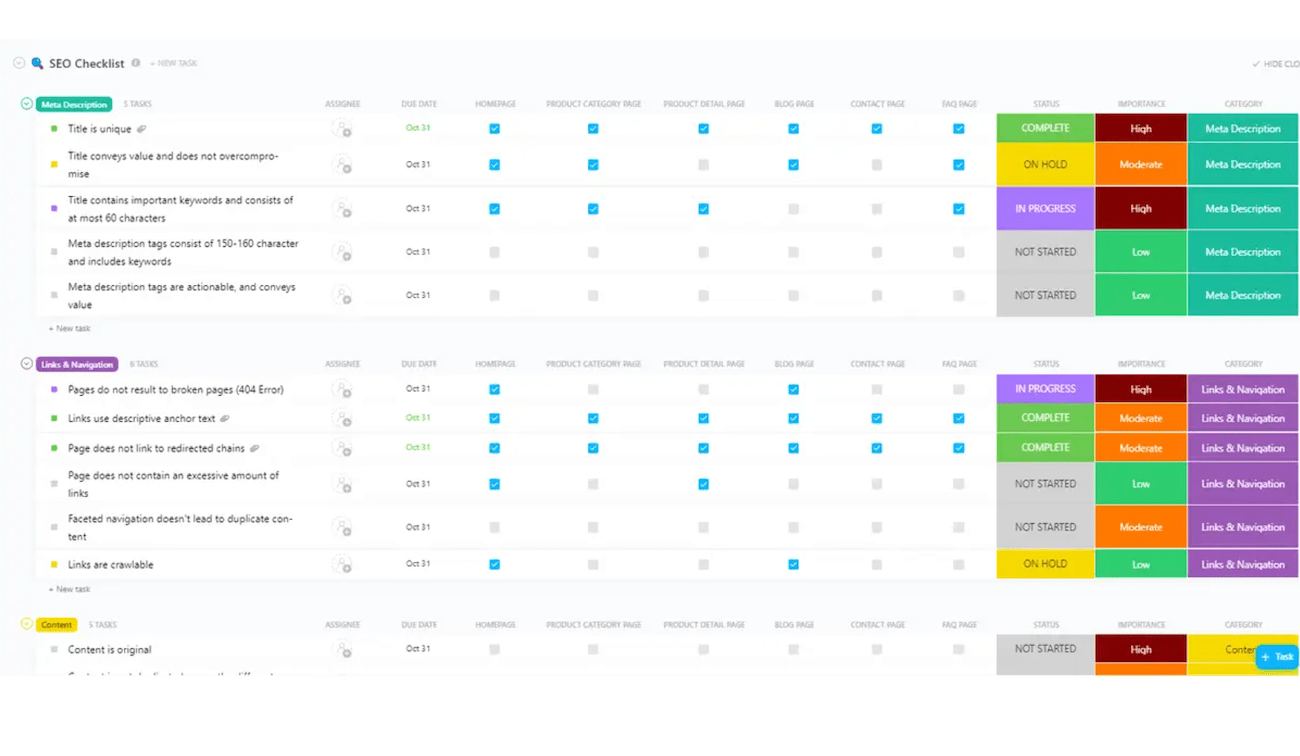
It comes pre-loaded with essential SEO tasks, which is great if you’re not sure where to start. You can also segment tasks into categories and prioritize work however you’d like.
However, you can easily set up custom checklists for individual pages and build new lists for different types of pages, like home, blog posts, landing pages, and FAQ pages. It’s a great choice whether you know exactly what you want to do or you need some help figuring that out.
Since the template only works with ClickUp, you’ll also be able to tap into its built-in project management and collaboration features.
SEO Research & Management: An advanced ClickUp template
This ClickUp template goes beyond basic keyword research. You can use it for your initial SEO planning and all the work involved with meeting your performance goals.
It’s possible to use this template on your own, but it works best when you’re collaborating with a small team. It takes longer to set up than the others and comes with a bunch of built in capabilities you’ll have to figure out how to use. However, it’s worth it if you want granular tracking, assignments, due dates, and analytics.
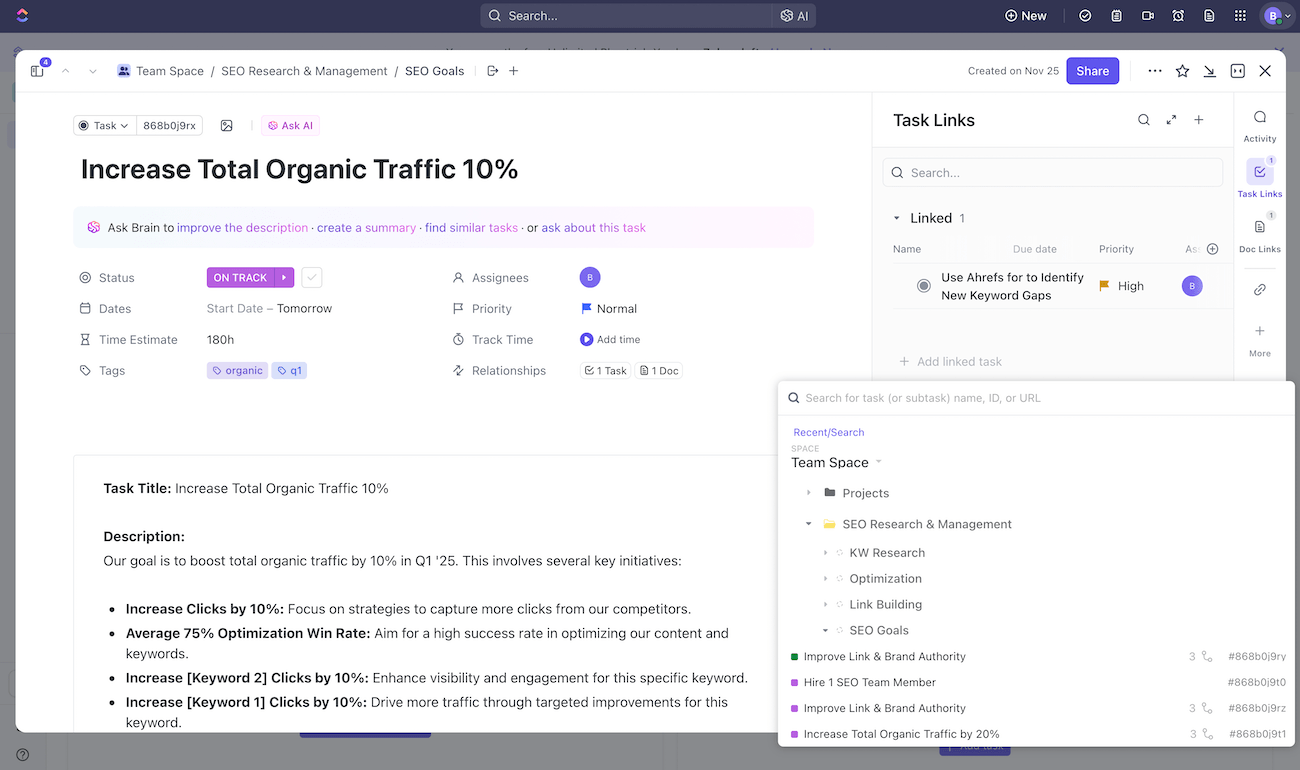
The best part about this template is how it walks you through breaking e a big-picture SEO goal into specific tasks.
For example, I started by creating a goal to increase total organic traffic in Q1 of next year. From there, it helped me get more specific. I created a list of tasks and linked them back to my goal so I can track progress towards it. Instead of relying on everyone remembering what to do next, each task is clearly laid out.
You can get as granular as you’d like. Maybe you want to target specific keywords or build a certain number of backlinks. Everything clearly ties back to the original goal automatically.
Once you’ve created all of your tasks, it’s easy to tag your team and watch the project unfold on a day-to-day basis.
The only downside I came across is that the time estimate field automatically converts to hours. I’d personally rather see “3 months” than “720 hours” in that field, but it depends on the timeframes you’re talking about and how detailed you decide to get.
Smartsheet: To allocate and manage SEO resources
Smartsheet is a powerful spreadsheet-like project management solution with relational databases you can use to build business apps. It’s ideal for collaborative work and tracking progress across multiple projects, teams, and departments.
Most of Smartsheet’s templates are fairly generic and easy to use for any type of project. You’ll just need to tweak some of the default text to fit your needs (in this case, SEO).
More Smartsheet coverage: Smartsheet review | Smartsheet vs Airtable | Smartsheet alternatives.
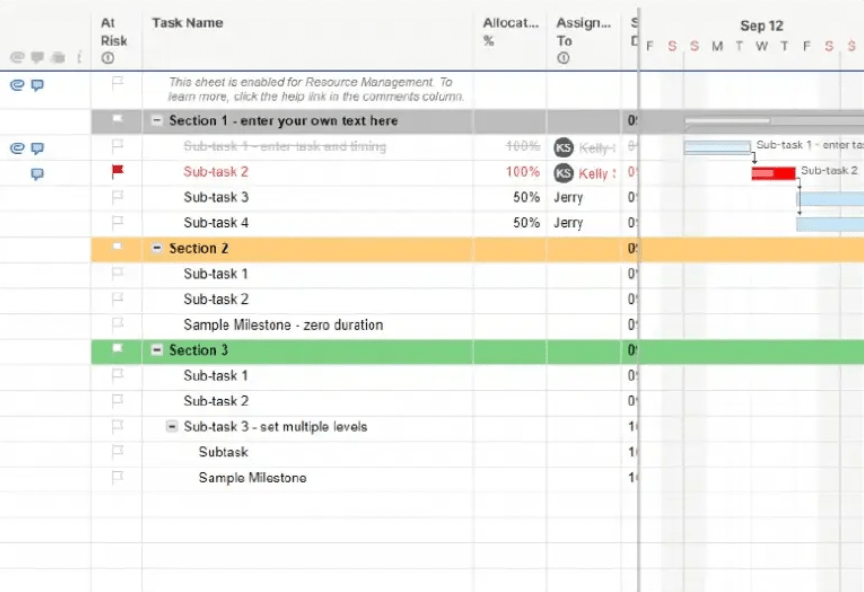
I recommend Smartsheet’s project with resource management template if you like spreadsheets, but feel like you’ve outgrown the capabilities of Excel and Google Sheets. It’ll feel familiar but you’ll get dozens of extra project management features to organize tasks and see them through to completion.
This template is particularly useful if you’re assigning tasks to multiple team members. It helps you manage workloads to ensure you’re not overloading employees or contractors, while also giving everyone plenty to keep busy.
You can use this template to plan SEO projects, view tasks across employees, monitor resource allocation, and view high-level timelines with real time updates.
The biggest drawback is that it’s not specifically for SEO — you’ll need to spend some time getting things set up before you actually start using it.
SEO project management templates for Notion
Notion makes it possible to build collaborative workspaces for teams, entire businesses, or individuals looking for a better way to manage their work. It’s simple and versatile enough to accommodate different types of projects — including marketing and SEO.
There’s a decent free plan you can use to see if it’s a good fit for you. While it does require configuration up front, it puts you in complete control.
More Notion coverage: Notion review | Coda vs Notion | Obsidian vs Notion.
SEO Campaign Hub: A free campaign planner
This template is simple and straightforward yet powerful enough to help you manage page-level optimization, sitewide updates, and monthly maintenance tasks.
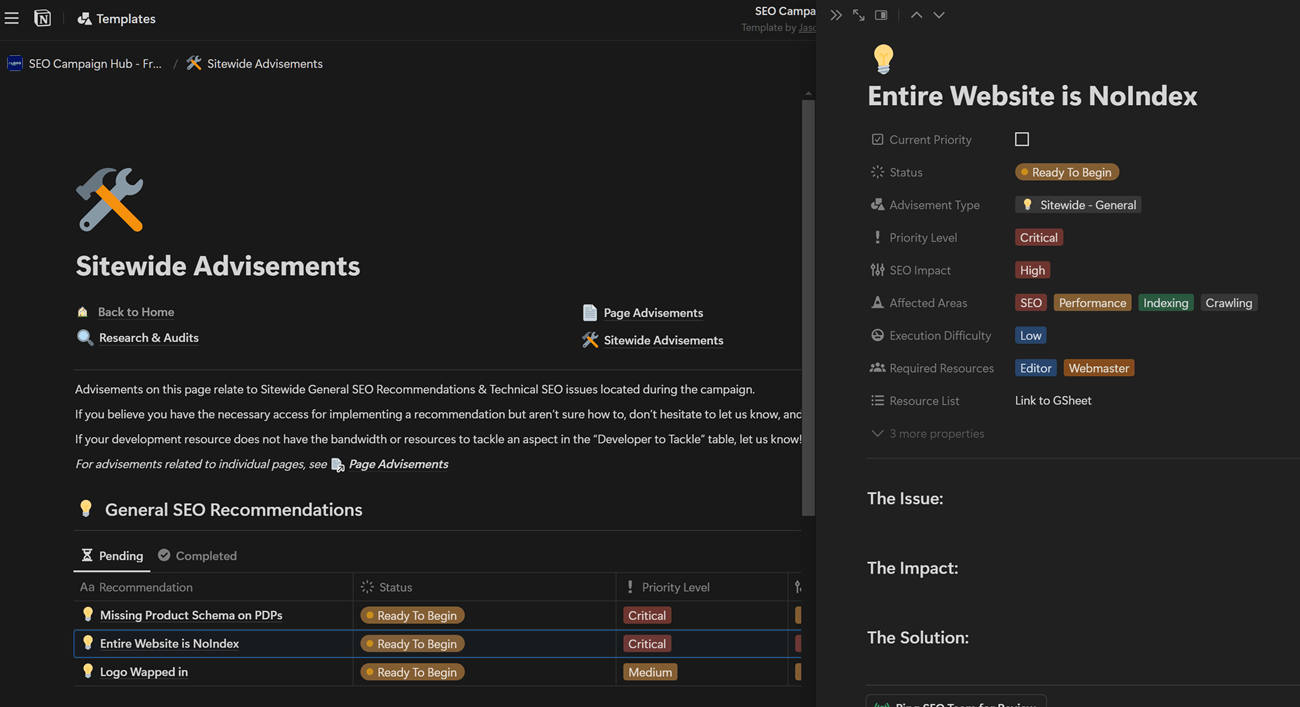
You’ll be able to set priority level, track status, add notes, set difficulty level, attach SOPs and learning resources, and even track expected impact. While there aren’t tools for keyword research, backlinking, analytics, or content audits, there is a centralized place to store all of those elements if you do them.
Despite its simplicity, it includes a lot of extras you won’t find in other free templates. There’s also a full video walkthrough showing you how to set it up and how to use it.
If you already use Notion, you can easily tie this template into your existing workspace and workflows. If you don’t, it’s just as great as a standalone tool.
The SEO Roadmap: For high-level SEO project planning
This is one of the most comprehensive SEO project management templates you’ll find on the web. It’s $97, which sounds like a lot. But The SEO Roadmap is worth every penny if you’re looking for a complete, self-contained system to manage everything SEO.
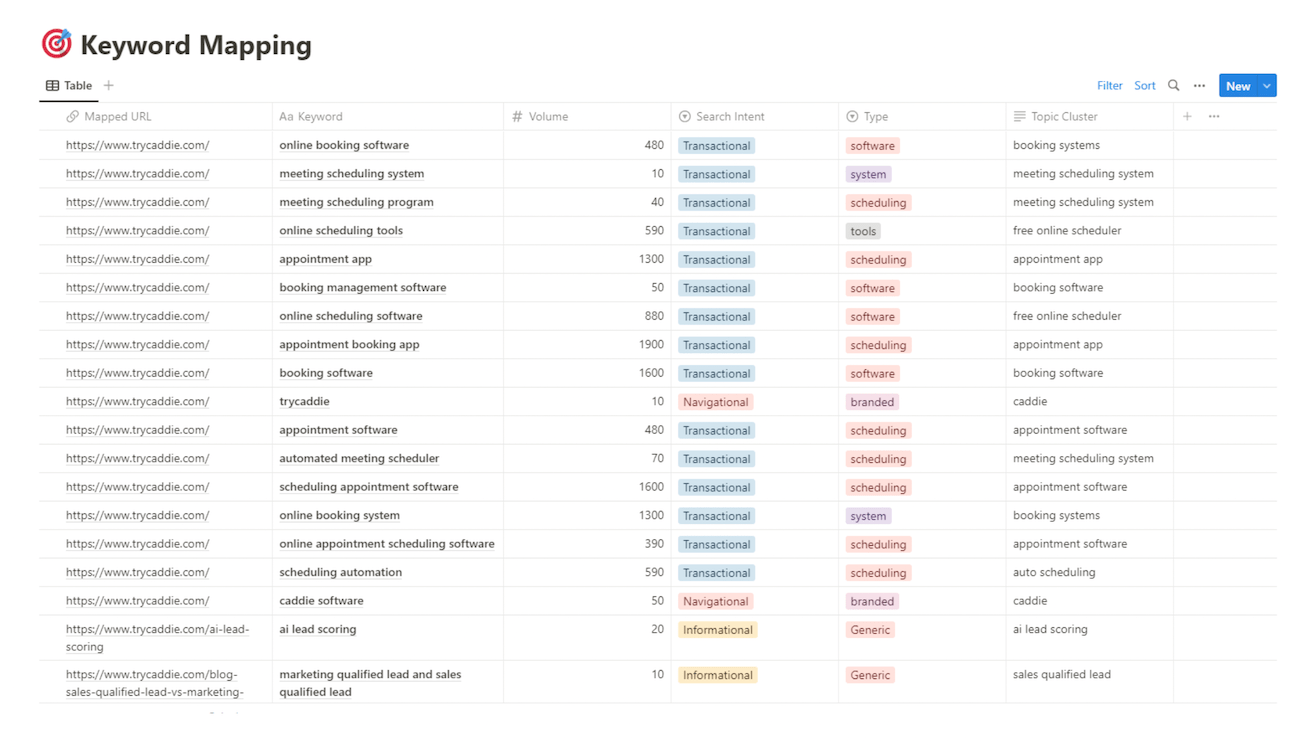
From daily task management to big-picture strategy and figuring out where to start in the first place, this “template” includes numerous templates that cover everything you need.
There are templates for keyword research, web architecture, audits, technical SEO, content planning, reporting, and more all in one centralized workspace.
You’ll also get pre-made Kanban, calendar, and timeline views plus databases to store, track, and manage every piece of your new system.
As a complete system, you won’t have to worry about piecing together free templates that may or may not work together. With The SEO Roadmap, you get it all preconfigured for you. On top of that, you’ll enjoy free updates and improvements for life.
SEO project management templates for Excel and Google Sheets
Prefer spreadsheets? They’re a simple and familiar way to manage work, especially for small, simple, or repeated projects and tasks.
Neither Excel or Google Sheets has pre-built templates specifically for SEO. However, there are dozens of templates available from third parties. Here are two of the best.
More spreadsheet coverage: Free Excel alternatives | Excel tips and tricks | Learn Excel online.
Ahrefs SEO Checklist: Comprehensive task management
We can’t talk about SEO without talking about Ahrefs. As an industry expert and SEO software provider, it’s safe to say they know what they’re doing — their comprehensive and interactive SEO checklist for Google Sheets is no exception.
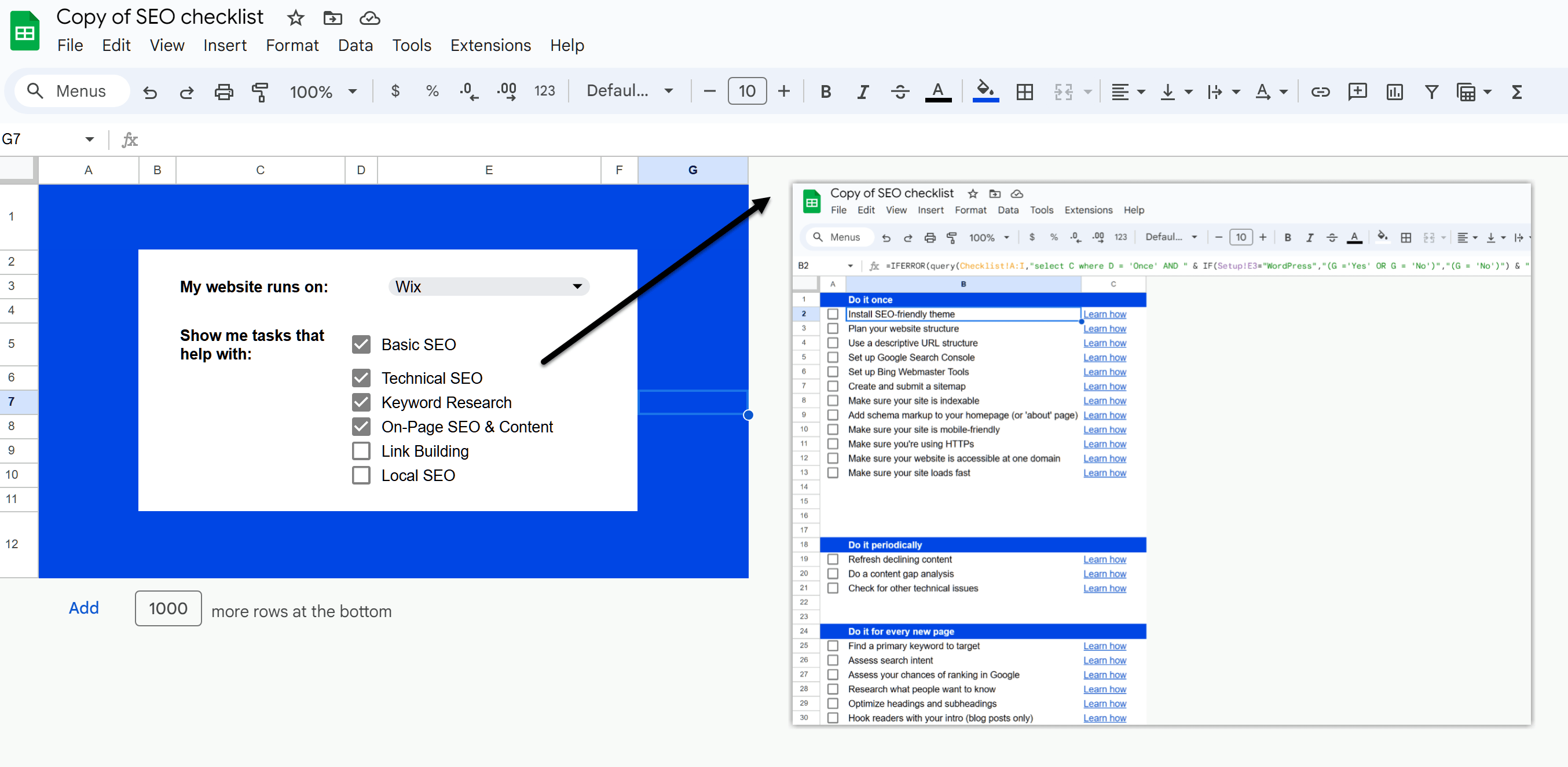
Once you’ve created your own copy of the template, all you have to do is choose what your website runs on and select the types of tasks you want to work on.
The other sheet automatically updates to match your selections with tasks organized into groups for one-off work, periodical tasks, and tasks you should repeat for every page. Not only that, but you’ll also get a link to Ahrefs’ blog showing you exactly how to do every task.
This is an excellent option if you aren’t quite sure what you need to do or how to do it.
You can even make copies of the template or copy and paste the checklist into your project management tool if you’d like.
GanttPRO’s SEO Content Template: General project management
GanttPRO is an online Gantt chart creator. It also includes simple project management features like task assignments, budget planning, time tracking, and more. However, they also offer a free SEO marketing plan template for Excel and Google Sheets if you don’t want to pay for GanttPRO.
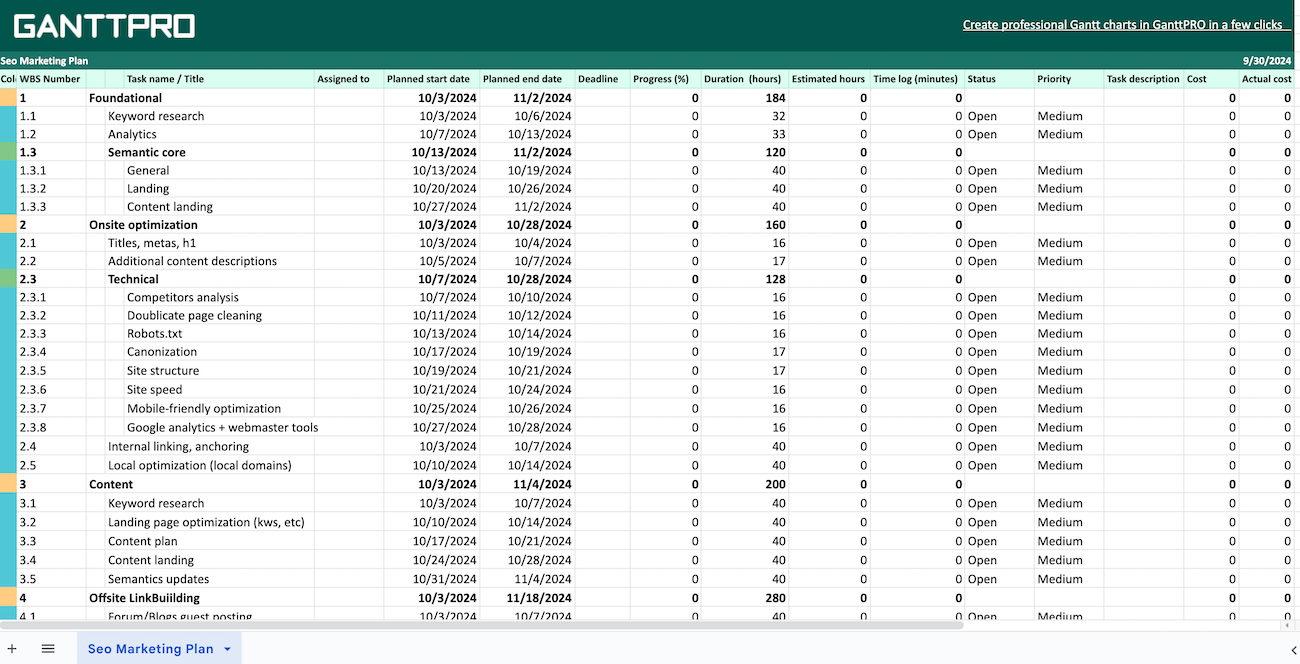
The template provides a basic starting point if you want to improve your website but don’t know where to start.
Once you make your own copy, you’ll have a pre-made list of 35 tasks segmented into different categories, including foundational SEO, onsite, technical, content, and link building.
There are subtasks for each category and columns to track your progress, manage priorities, and take notes.
While I wish some of the columns had pre-built dropdowns, you can easily configure those in a few minutes if you’d like. There’s also plenty of room to customize the template to match your needs.
Stackby SEO project management templates
Stackby is a no-code platform that leverages relational databases to build custom no-code automations and applications. You can sign up for Stackby for free and access over 500 templates, including more than a dozen for SEO.
Technical SEO Audit Template: Run comprehensive technical audits
So far, we’ve covered content management, project management, and simple tasks lists. This template covers a different area: technical SEO audits. It includes two tables, one for individual tasks and one for polished SEO audit reports for different areas.
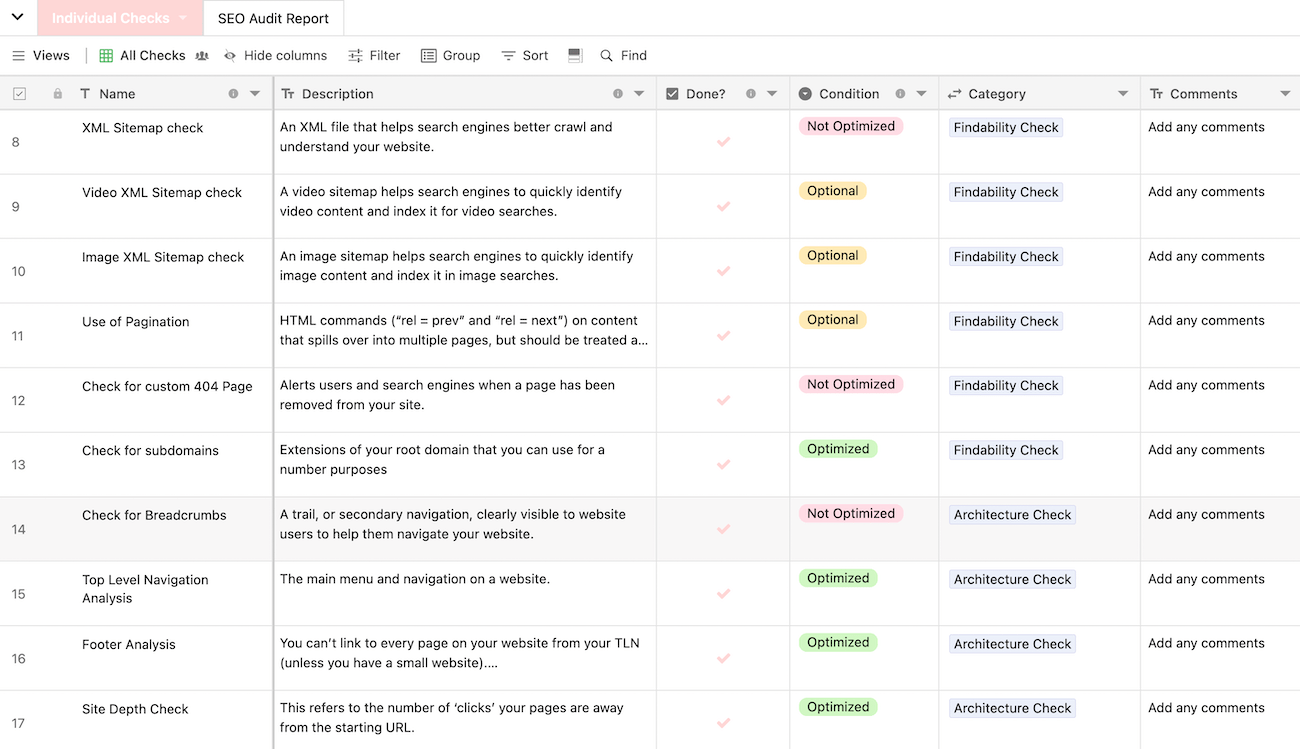
It comes preloaded with 59 technical SEO tasks and you can remove or add tasks as needed. You’ll be able to provide a description, category, and comments with clear “Optimized” or “Not Optimized” indicators to show progress.
With the audit reports, it’s easy to see how many tasks there are, how many have been completed, and how many are left.
Everything updates in real time as work gets done so you never have to worry about using outdated information. But perhaps the best part is that it integrates with SEO tools like Ahrefs and Google Search Console.
You’ll even get free updates as SEO best practices and requirements change so you don’t have to stay on top of it yourself.
The main drawback is that there’s not really a way to track any other type of work. You can certainly build on top of the template or pair it with other Stackby templates, but it’s far from everything you’ll need to manage SEO projects.
SEO Competitor Analysis Template: Identify keyword gaps and content opportunities
If you use Ahrefs, you’ll love Stackby’s SEO competitor analysis template. It automatically brings competitor data from Ahrefs via its API into the system, making it easy to keep an eye on that information while managing tasks and projects in one place.
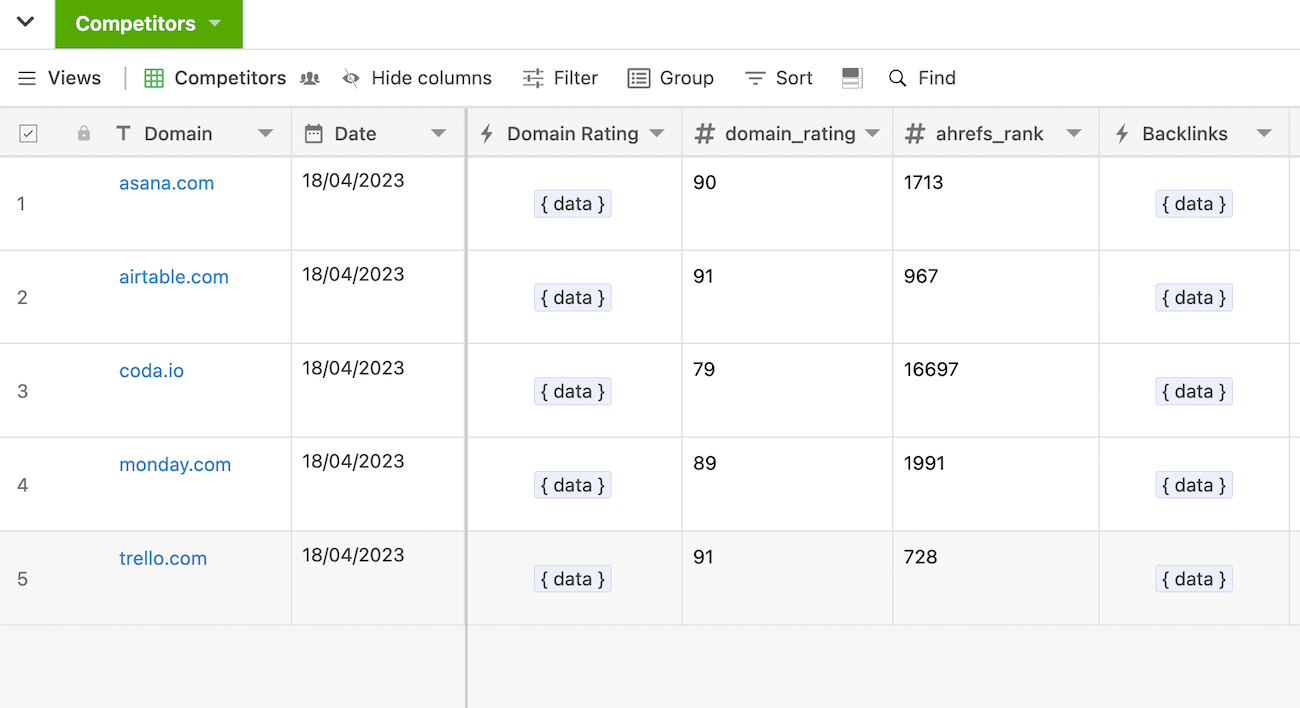
You’ll be able to keep track of each competitor’s domain rating, Ahrefs rank, backlinks, traffic, and keywords at a high level. No more going back and forth between tools.
From there, you’ll be able to identify gaps in your own coverage based on the phrases and keywords your competitors are currently ranking for.
There are a few downsides, though. This template doesn’t have anything beyond the competitors table, so you’ll have to build out your own SEO project management template or combine it with premade templates to create a full system.
Aside from that, you also have to be on a paid Ahrefs plan. It’s one of the best SEO audit tools out there, but it does come with a hefty price tag.
Types of SEO project management templates
SEO project management templates range from free to expensive, simple to comprehensive, and easy to complicated. There are dozens of different subcategories of SEO, each with their own templates.
Common examples include:
- SEO audit templates.
- Technical SEO templates.
- Keyword research templates.
- Content planning templates.
- SEO checklist templates.
- Competitive analysis templates.
- On-page optimization templates.
- Off-page SEO templates.
- Link building templates.
- Website architecture templates for SEO.
- Local SEO templates.
- SEO resource allocation templates.
- SEO strategy templates.
As you can see, some are hyper-specific while others are more broad. You can even zoom out and consider general marketing plan templates if you’re not only focused on SEO.
If you go with a free template, you’ll likely have to combine multiple templates together to achieve what you’re after. Paid templates are more comprehensive, but not free. It’s up to you to decide which of those tradeoffs makes the most sense.
Things to look out for when using SEO project management templates
There are hundreds (if not thousands) of SEO templates on the internet. Unfortunately, they’re not all created equal, especially those with premade task lists designed to help you optimize your website.
Blindly following this advice without researching or confirming each task’s importance can lead to wasting time and ultimately, disappointment.
It’s always good to do what you can to understand why you’re doing what you’re doing.
Aside from that, the sheer number of templates can feel overwhelming. Keep the following tips in mind when deciding which one(s) to use.
It’s ok to use more than one
If you go with a free template, it likely won’t cover every aspect of SEO — and that’s totally fine.
You can use one template for technical audits, another for keyword research, and a third for ongoing content creation.
Getting the exact template and setup you need for each part of the process is often easier than trying to fit everything in one place.
My best advice though? Stick to one tool. Don’t use monday.com for technical audits and ClickUp for content planning. Instead, look for separate technical audit templates and content planning templates that work with the same tool.
This will save you a lot of headache and money if you end up upgrading to a paid plan.
An all-in-one is fine if you have the resources to manage it
It’s tempting to want everything in one place. Further, it’s a great experience when users don’t have to switch between tools or documents or views.
However, setups like this are complicated and easy to break. If you’re not familiar with the tool, it’s a good idea to spend time getting comfortable with it so you know what to do if something isn’t working how you expected.
Otherwise, you run the risk of breaking the template and not being able to fix it.
Don’t be afraid to customize
While starting with a template is a smart way to save time, you’ll likely have to customize it to match your needs. Learning the basics of the software you’re using will go a long way and it’s well worth the extra effort.
Rather than changing how you work to fit the template, the template should change to match your workflow.
















Leave a Reply